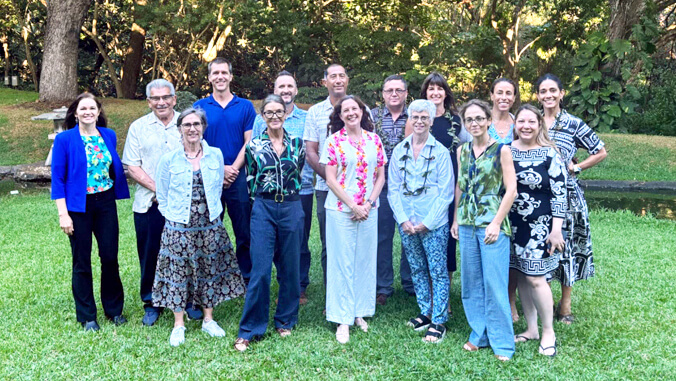
Indigenous science, coastal resilience and marine mammals were a few of the key topics covered in a visit to the University of Hawaiʻi at Mānoa’s Hawaiʻi Institute of Marine Biology (HIMB) from members of the Ocean Research Advisory Panel (ORAP) on September 3. ORAP spent time with HIMB researchers and explored the Heʻeia National Estuarine Research Reserve (NERR) to better understand current research on the state of our oceans.
ORAP’s 18 members represent the fields of marine science, technology and policy, and hold the important task of making recommendations to the White House’s Ocean Policy Committee. The visit to Hawaiʻi was intended to not only inform what such a national strategy should look like, but to also acquire ideas about which areas of policy the group should focus on in the cohort’s second year.

The team of advisors explored topics including Indigenous science and technology through a Native Hawaiian lens; the latest approaches to coral restoration and resilience; the changing state of Hawaiʻi fisheries; breakthroughs in shark conservation; whales and dolphins as sentinels of our changing ocean; and biocultural practices strategies for coastal resilience.
“It was an honor to host ORAP,” said Megan Donahue, interim director of HIMB. “We shared how HIMB research informs the challenges and opportunities for ocean conservation in biocultural restoration of our coastal communities, strategies for reef resilience and coastal protection, and understanding how a diversity of marine organisms are responding and adapting to our changing oceans.”
Restoration efforts, co-stewardship
The team visited Paepae o Heʻeia, where ORAP toured the restoration efforts of the 800-year-old Hawaiian fish pond and learned about the benefits of Indigenous aquaculture systems. The panel observed research underway at NERR, which is one of the nation’s leading models of co-stewardship, including collaborative research between a university and an Indigenous community.
“The Biden Administration has issued executive memos and federal guidance about including Indigenous Knowledge in research, policy, and decision making, but many in the policy sphere still don’t know what that can look like,” said HIMB Assistant Professor and ORAP member Kawika Winter, who is director of Heʻeia NERR. “By bringing the Ocean Research Advisory Panel here, they are able to witness, experience, and learn first-hand what it can look like to effectively weave Indigenous Knowledge and university research.”
ORAP focused the first of its two-year term on advising the Ocean Policy Committee regarding the development of a National Ocean Data Strategy that improves data management, grows partnerships, and advances access and usability.

